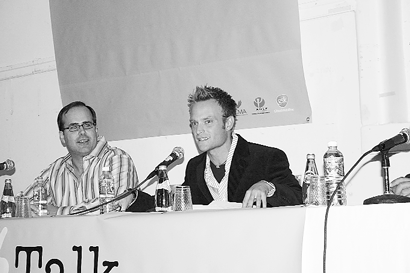A Community Center panel addresses the crisis of depression among gays
On the evening of October 11, at a National Coming Out Day event at the Lesbian, Gay, Bisexual and Transgender Community Center, gay men stepped up in public to share their very personal struggles with depression and demonstrated how coming out poses challenges beyond sexual expression.
Dr. Matt Majeske, a psychiatrist at St. Vincent’s Hospital, moderated a panel called “Talk About It: Coming Out about Depression in the LGBT Community.” Television actor Chad Allen and Olympic diver Greg Louganis spoke candidly about their own battles with clinical depression, which affects 17.2 percent of men who have sex with men compared with only 3.8 percent of men who do not, according to “The Urban Men’s Health Study” published in the American Journal of Psychiatry.
A capacity crowd filled the Center’s cold and dimly lit Kaplan Assembly Hall. The speakers sat at a long table on a small stage, but at times the discussion felt more like the room was gathered around a kitchen table. There were no prepared statements and the speakers offered disclaimers about offering any permanent solutions. In fact, the speakers admitted that they still struggle with clinical depression.
The aim of the event was to get people talking, to exchange stories, to eliminate isolation that leads to depression and to share coping mechanisms and treatment experiences, they said. Most importantly it was to tell people who are consumed with feelings of sadness, worthlessness, guilt and anxiety that depression can be effectively addressed.
“This is a huge public health problem” for the LGBT community, Majeske said.
Depression is not just feeling sad, he said, it is an illness that can seriously disrupt people’s lives and it can even be fatal. Fifteen percent of those who suffer from depression die of suicide, according to Majeske, but “there is hope because depression is very treatable,” he said. Everything from exercise to psychotherapy and prescription drugs can be used to treat depression and avoid suicide, or as Louganis called it, “dying of sadness.”
The five-time Olympic gold medalist, wearing a purple shirt and dark blazer, a goatee and an earring, told the crowd that during his athletic career he suffered from depression and survived suicide attempts. Competitive pressure, living in the closet and then coming out as gay and HIV-positive, contributed to his depression.
“I am learning to cope and deal with my depression every single day,” Louganis said.
Louganis eventually began to take medication, but his treatment didn’t end there.
“Medication got me into a therapist to learn coping skills,” he said. Besides therapy and anti-depressants, Louganis also practices less clinical prevention routines. He goes to spinning class and practices yoga, which he called a “godsend.” Majeske concurred, saying that exercise can be a powerful anti-depression tool. Louganis keeps in touch with his friends and said that his dogs also got him through rough episodes.
“They gave me a reason to get up,” he said.
Symptoms of depression can be a persistent sad mood, decrease of interest and pleasure with life, fatigue, weight loss, increase or decrease in sleep, suicidal thinking and behavior.
Allen, with blond spiky hair, choked up when he spoke about being on an airplane and having a panic attack.
“It was as if God whispered in my ear that the plane was not going to make it,” he said. He described the fear he sometimes feels as “scarier than the look in my dad’s eye when I told him I was gay.”
Allen, who starred in “St. Elsewhere,” “Webster,” “My Two Dads” and, more recently, in “Dr. Quinn: Medicine Woman,” admitted that he has not yet conquered the illness.
“I am a young man who knows what it’s like to wake up in the morning and be overcome by the feelings in my heart and soul,” Allen said. “I did not come here because I am recovered from depression.”
Sometimes he feels like a creature is going to come and take him away at any time, he said.
But with help he knows how to manage those feelings.
“So much of the fear that I was feeling was really a lot of sadness,” he said. The fear and sadness still come to him, but now Allen said he embraces it.
“I choose to believe that the thing that brought us here is a gift and not a curse,” he said, referring to what he called an extraordinary capacity to feel. “I am very, very sensitive and I am sick and tired of being ashamed of it.”
According to Allen he grew up in a very stern Roman Catholic family where men did not typically express their emotions.
According to the Gay and Lesbian Medical Association, there are several reasons why gay men may be more susceptible to depression. Living in a homophobic society, facing possible rejection from family, not having equal legal recognition of relationships, being closeted and abusing substances are all risk factors for depression.
After the speakers finished, audience members lined up at a microphone to ask questions and share stories. At one point, a young man named Joseph stood at the microphone and gave a powerful expression of how debilitating the illness can be when it takes hold of the body and mind. Crying, he told the crowded room that he keeps hitting bottom. He sometimes doesn’t leave his apartment for days and loses jobs for missing work or for mistakes that he isn’t even conscious of making. He can no longer support himself financially and said he was embarrassed to say so in a room full of gay men, but that he desperately needed help
“I don’t want to get up tomorrow morning,” he said.
“Bro, what you just did blows me away,” Allen said in a response, which inspired lasting applause. “If you can get up there and do what you just did, then you can beat this.”
After the panel ended, many men lined up to thank Louganis and Allen. Others approached Joseph to offer support. Christopher Racster, 34, of Los Angeles a lifelong sufferer of depression, said, “He needs to know he’s not alone. He has more strength and courage than he knows. To get up in front of gay men and women and say anything is hard, it’s devastating. And to get up and bare your soul in front of a whole group of people is courageous and beautiful and that in and of itself deserves to be honored.


































